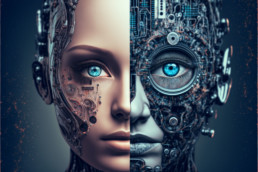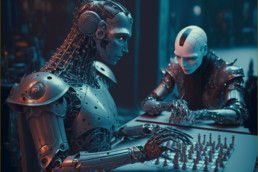Artificial Intelligence: A Game Changer for Human Life and the Future
Artificial Intelligence (AI) is one of the most exciting and rapidly evolving technologies of our time. With the potential to transform industries, improve our lives, and shape the future, AI is a topic of great interest and discussion. However, as with any new technology, there are both pros and cons to consider.
On the one hand, AI has the potential to revolutionize industries, improve efficiency, and solve complex problems. For example, AI is being used in healthcare to improve patient outcomes, in finance to prevent fraud, and in transportation to optimize routes. In the future, AI may even play a critical role in addressing global issues such as climate change and poverty.
On the other hand, there are also concerns about the impact of AI on employment, privacy, and security. For example, as AI becomes more advanced, there is a risk that it could replace human workers, leading to unemployment. There are also concerns about the use of AI for surveillance and the potential for AI systems to be hacked or used maliciously.
Despite these concerns, it is clear that AI will play a major role in shaping the future. In the coming years, AI technology is expected to continue to advance, and we will see increasingly sophisticated AI systems in a wide range of industries.
It is estimated that within the next decade, AI will be fully integrated into many areas of our lives, from our homes and workplaces to our healthcare and entertainment.
In conclusion, Artificial Intelligence is a game changer for human life and the future. While there are pros and cons to consider, it is clear that AI will play a major role in shaping the future. As technology continues to advance, it will be important to stay informed and engaged in the conversation about the impact of AI on society, and to work together to ensure that AI is developed and used in ways that benefit all of humanity.
Problem solving agents in artificial intelligence
Problem solving agents in artificial intelligence (AI) are computer programs or systems that are designed to solve specific problems or perform specific tasks. These agents use AI techniques such as search, planning, and reasoning to find solutions to problems.
There are several types of problem solving agents, including:
- Search-based agents: These agents use search algorithms to find solutions to problems. For example, a search-based agent might use algorithms like breadth-first search or A* to find the shortest path from one location to another.
- Planning agents: These agents use planning algorithms to determine the steps necessary to achieve a specific goal. For example, a robot equipped with a planning agent might use a planning algorithm to determine the sequence of actions necessary to pick up an object and place it in a specific location.
- Reasoning agents: These agents use reasoning and logic to solve problems. For example, a reasoning agent might use rules and logical statements to deduce the likely cause of a problem.
- Learning agents: These agents use machine learning techniques to learn from experience and improve their performance over time. For example, a learning agent might use a neural network to learn how to identify objects in images.
These agents can be used in a wide range of applications, such as robotics, natural language processing, computer vision, and decision making.
It’s important to note that these agents are not human-like reasoning or intelligence, they are designed to solve specific problems and their performance and success rely on the quality of the data and the model used.
Problem solving agents in artificial intelligence (AI) have a wide range of applications across various industries and fields, such as:
- Robotics: Problem solving agents can be used to control robots and automate tasks such as manufacturing, transportation, and logistics.
- Natural Language Processing (NLP): Problem solving agents can be used to understand and generate natural language, which is used for tasks such as language translation, speech recognition, and text-to-speech synthesis.
- Computer Vision: Problem solving agents can be used to analyze and understand visual data, such as images and videos, which is used in applications such as object recognition, facial recognition, and surveillance.
- Healthcare: Problem solving agents can be used to assist with medical diagnoses, treatment planning, and drug discovery.
- Finance: Problem solving agents can be used to analyze financial data and make predictions about stock prices, currency exchange rates, and credit risk.
- Gaming: Problem solving agents can be used to create intelligent non-player characters (NPCs) and to create more challenging game experiences.
- Autonomous vehicles: Problem solving agents can be used to control self-driving cars, drones, and other autonomous vehicles.
- E-commerce: Problem solving agents can be used to provide personalized recommendations for products and services, to improve the efficiency of supply chain management and logistics.
- Cybersecurity: Problem solving agents can be used to detect and prevent cyber threats such as malware, hacking, and intrusion.
These are just a few examples of the wide range of applications for problem solving agents in AI, and as the technology continues to advance, the possibilities for their use will continue to expand.
Can AI bring happiness?
AI has the potential to bring happiness to people by improving their quality of life through various means such as increasing efficiency and productivity, providing personalized recommendations and assistance, and facilitating communication and connection with others.
However, it is important to note that the impact of AI on happiness is complex and can vary depending on the specific application and context of use.
Additionally, it is important to consider the ethical implications of using AI and to ensure that it is used in a responsible and equitable manner.
A few examples of specific applications and contexts of use where AI can potentially bring happiness to people:
- Healthcare: AI-powered tools and systems can help improve the accuracy and efficiency of medical diagnoses and treatment plans, which can improve patient outcomes and increase overall well-being.
- Personalization: AI-powered platforms can provide personalized recommendations for products, media, and services, which can help individuals discover new things that align with their interests and preferences, thus increasing their happiness.
- Social Connection: AI-powered chatbots and virtual assistants can facilitate communication and connection with others, especially for people who have difficulty interacting with others in person, such as elderly or disabled individuals.
- Productivity: AI-powered tools can help individuals and businesses increase efficiency and automate repetitive tasks, which can free up time and energy for more enjoyable and fulfilling activities.
- Entertainment: AI-powered personal assistants like Amazon Echo and Google Home can provide entertaining and informative content, play music, answer questions and control other smart home devices, giving users more control of their environment, and making their experience more pleasant.
These are just a few examples, there are many other ways AI can potentially bring happiness to people depending on the specific context and use case.



